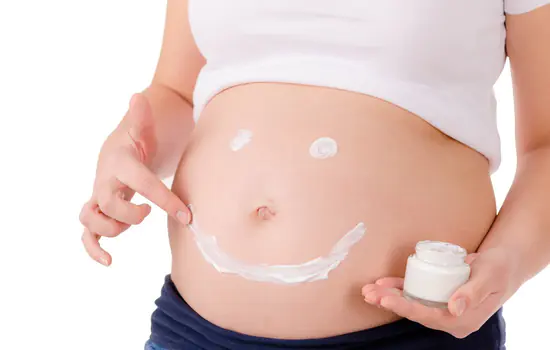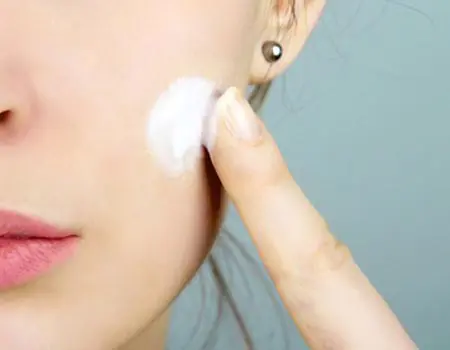Dry skin during pregnancy is a common, although not entirely pleasant, phenomenon. It is a feeling of tightness and irritation, in which the skin peels off, becomes covered with small scales and becomes dull. This type of tone causes discomfort, redness and itching. Dryness is a violation of fat and water metabolism, acid-base balance, as well as malfunctions of the sweat and sebaceous glands. If your tone is very dry, cracks appear through which germs and bacteria can get in, which can cause inflammation and acne. Such skin occurs in older people (this is a natural phenomenon during the aging process), in people with hereditary dry skin tone, in certain diseases and in women during pregnancy. In this article we will learn why dry skin occurs during pregnancy and how to deal with it.

Dry skin in pregnant women - what is the reason for metamorphosis?
During pregnancy, significant changes occur in a woman’s body, namely hormonal fluctuations. The level of the female sex hormone, estrogen, increases, which can suppress the production of sebum and reduce its secretion. After all, complex treatment of acne includes oral contraceptives containing estrogens. Thus, less sebum is secreted on the surface of the epidermis.
The influence of another hormone, progesterone, which is very important for expectant mothers, can reduce the elasticity of the skin, making it thin and sensitive. All this contributes to dryness and flaking of the epidermis. However, the effect of progesterone can be called a double-edged sword: on the one hand, it is dryness, and on the other, it has the opposite effect, increasing the activity of the sebaceous glands and, as a result, the development of acne.
So, those who had oily skin before pregnancy will be in for a pleasant surprise. It will become normal, oily shine, blackheads and pimples will disappear. Caring for it will change radically; there will be no need to constantly powder it, use antiseptics, or apply scrubs and peels. This is the positive side of the effect of estrogen on the skin.
It will be more difficult for those with dry and normal skin during pregnancy, since these types are characterized by normal or weak sebum production. As a result, the skin will become drier, problematic and sensitive, leading to itching, flaking and allergic reactions.
Not only the skin, but also hair and nails undergo changes. All these symptoms, together with others, may indicate the occurrence of thyroid diseases, namely hypothyroidism (decreased synthesis of thyroid hormones). In this case, you need to consult an endocrinologist and correct this condition.
Also, vitamin deficiency during pregnancy can lead to dry skin. The lack of vitamins A and E has a particularly deplorable effect, which leads to irritation, peeling and dry skin.
To solve these problems, it is best to contact specialists. They will prescribe treatment to eliminate the problems described above, correct the activity of the sebaceous glands, and prescribe treatment for dry or oily skin that is prone to acne. However, it should be remembered that expecting a child is a crucial period when you should not self-medicate and prescribe medications yourself.
Does dry skin affect the fetus?
Let's say right away that it has absolutely no effect. You need to worry when dryness is a consequence of a certain pathology. And if there are no dangerous symptoms, then there is no need to worry. Very often, these types of symptoms signal the presence of an allergic reaction to certain foods and household chemicals. The only danger is that intolerance to certain substances can be transmitted intrauterinely to the fetus.

However, dry skin does not in any way affect the development and growth of the fetus.
Only the expectant mother experiences unpleasant sensations and discomfort, since dry skin can lead to other unpleasant consequences:
- the appearance of stretch marks in certain areas of the body;
- itching;
- peeling of the epidermis;
- brittleness and dryness of hair;
- dandruff;
- the occurrence of microcracks.
All these unpleasant sensations should be eliminated by a set of special measures that will primarily eliminate the cause of dryness. External local exposure is also necessary, so moisturizing and nourishing the skin are mandatory procedures in the fight against dehydration.
What is your skin type?
It should be clarified that every person is born with a certain type of tone, which is determined by his genetics. However, as a result of hormonal changes in women, certain diseases and age-related decline, the type of tone may change. So, while expecting a child, a woman’s skin becomes drier, regardless of heredity and genetics. Therefore, it is very important to find out what type of skin you currently have. How to do it?
To determine your tone type, you need to wash your face with soap (for diagnostic purposes only, in other cases this action is unacceptable). Leave your face like this for an hour without applying any cosmetics to it. After an hour, pay attention to the condition of the epidermis; if there is a feeling of tightness, peeling in some areas, hidden pores, then this type of tone is dry.

Oily skin is manifested by large pores with comedones (blackheads), oily sheen, and acne on the face.
A normal tone is considered close to the ideal type. Such skin does not cause trouble to its owner. After washing with soap, he feels good, there is no tightness, irritation or flaking. Only a slight shine may appear in the T-zone (chin, nose, forehead). Also in this area you can notice the presence of several comedones.
If this test does not give accurate results, then you can apply a rich cream to your face. If the tone type is dry, then the cream will be instantly absorbed without leaving an oily sheen on the face. If you apply a greasy cream to a greasy tone, you will experience some discomfort in the form of a heavy oil film on your face. A normal type of tone will react differently: on dry areas the cream will be absorbed well, but on oily areas it will remain.
Whatever changes occur to your skin during pregnancy, you will have to adapt to them.
How to care for your skin during pregnancy
First of all, you will have to change the care itself and the arsenal of cosmetics. You will have to select skincare procedures and cosmetics depending on the new condition of the skin. You can choose cosmetics from a certain line, but it is desirable that such cosmetics contain natural ingredients (in this case, the risk of developing an allergic reaction will be minimal). The presence of vitamins in a cosmetic product is also important. They will help make the skin smooth, soft and velvety, eliminate dryness, flaking and redness. The cosmetic composition must include hyaluronic acid and seaweed extract. They will perfectly moisturize the skin and saturate it with moisture. Thermal water will have a good moisturizing and soothing effect; it is a necessary care product for sensitive and problematic skin.
Daily skin care during pregnancy includes three stages:
- The first stage is cleansing the skin.
- The second stage is toning.
- The third stage is hydration and nutrition.
Cleansing

Dry skin during pregnancy requires special care. Care should be delicate and gentle so as not to injure already dry skin. Gentle milk, micellar water and foam based on thermal water are used as cleansers.
Toning
A mandatory stage of the skincare procedure. The toner is designed to eliminate residues of cleansers. It also prepares the skin for subsequent stages of care. The tonic can be prepared on the basis of thermal water and include a decoction of medicinal plants.
Applying a moisturizer and nourisher
You need to moisturize and nourish the skin twice a day (if your skin is very dry, you can do it three times). Currently, all creams contain sunscreen filters. However, this is not always enough, so you also need to use sunscreens with a high protection factor. It should be remembered that excess ultraviolet radiation greatly dries the skin and damages its structure. It is important to take care of your skin during the night, so you need to cleanse and nourish it in the evening. After all, it is at night that increased regeneration of epidermal cells occurs.
Don't forget about dry eyelids during pregnancy. In this area, the skin is very sensitive, thin and delicate. Therefore, the use of eye cream is mandatory. Lips also suffer from dryness; they can also peel and crack. To eliminate unpleasant symptoms, you can massage your lips. It is carried out with a toothbrush using light circular movements. After the massage, you need to apply nutrients or moisturizers to your lips. For example, honey, olive oil, sour cream or cream.
Additional skin care includes the use of scrubs and peels. Scrubs should contain small abrasive particles and not injure the epidermis. They are carried out 1-2 times a week. You can also prepare scrubs at home from natural products and oils.
When choosing scrubs and cosmetics, you need to carefully study the label for the presence of essential oils. They are strong allergens and can cause an allergic reaction.
While expecting a child, it is better to avoid salon procedures. If suddenly for some reason they are necessary, then the cosmetologist should be warned about your condition.
In addition to skincare procedures, do not forget about a healthy lifestyle, which is the key to youth and beauty.

Prevention of dry skin is also important. To do this, the following measures are taken:
- compliance with the drinking regime, you need to drink about 2 liters of clean water per day;
- balanced and proper nutrition;
- adherence to sleep and rest patterns;
- categorically do not use soap (even baby soap) when washing your face;
- wash with slightly warm water (hot and warm water dries out the skin);
- use a special delicate foam for washing;
- regularly moisturize the skin, use moisturizing masks;
- use sunscreen;
- regularly scrub your face to eliminate flaking;
- When using household chemicals, wear protective rubber gloves;
- in winter, control the level of humidity in the room (radiators and air conditioners greatly dry the air, which negatively affects the skin);
- use olive, sesame or sunflower oil as body moisturizers.
How to eliminate dryness with masks
Using natural ingredients, you can prepare moisturizing and nourishing masks at home. Before preparing and applying masks to your face, you should make sure there is no allergic reaction. So, the most effective are the following masks:

Vitamin
To prepare a moisturizing mixture, you need to purchase ampoules with vitamins A and E at the pharmacy. These fat-soluble vitamins perfectly nourish and moisturize, and are also the basis for any masks. The mixture is prepared as follows: 2 tablespoons of crushed oatmeal are mixed with 1 tablespoon of olive oil and 2-3 drops of vitamin A and E are added. The mixture is thoroughly mixed and applied to the face for 15 minutes, then washed off with water at room temperature.
Egg yolk and oatmeal
Cook oat milk porridge. Take two tablespoons of porridge, add 1 tablespoon avocado oil, then add 1 egg yolk. Mix everything and apply to face. Leave for 20 minutes, then rinse with water.
Pear puree
Mash the pear together with the peel, add 1 tablespoon of olive oil and 1 tablespoon of natural yogurt. The mixture is applied to a clean face in a thick layer for 20 minutes, then washed off with water at room temperature.
Cottage cheese and parsley juice
Take 2 tablespoons of natural cottage cheese, add 1 teaspoon of fresh parsley juice, 2 teaspoons of flaxseed oil, half a teaspoon of fish oil and half a lemon zest. Mix everything and apply to face for 15 minutes. The mask is washed off with a cold decoction of parsley, then a nourishing cream is applied to the face.
Honey and yogurt
Take 1 tablespoon of natural honey and 1 tablespoon of natural yogurt. All ingredients are thoroughly mixed and applied to dry areas of the face or the entire face. The mixture is left on the face for 15-20 minutes, then washed off with cool water.
If the dryness is severe and nothing helps, then you must urgently consult a doctor to identify the true cause of the phenomenon.
Dry skin often brings a lot of worries to a woman during pregnancy. However, this is a fairly common phenomenon, affecting approximately 1/3 of expectant mothers.
Usually this problem manifests itself on the face, neck, arms, legs. Irritation and increased sensitivity may occur in these areas. There are several reasons that can cause severe dry skin during pregnancy:
- water requirement;
- disruption of the endocrine system;
- development of hypothyroidism.
At 4-5 months, a woman needs to drink at least 2 liters of water per day. The volume of blood in the body begins to increase and amniotic fluid is formed. All the fluid that enters the body is directed to the needs of the fetus, and the woman’s skin may suffer from dehydration.
Therefore, during pregnancy, expectant mothers notice dry skin. But after 20 weeks, you need to reduce the amount of liquid you drink to 1.5 liters per day, since organs and tissues begin to retain the amount of moisture they need.

Due to disruption of the endocrine system, the hormone estrogen begins to reduce the secretory ability of the sebaceous glands. As a result, the amount of sebum produced, which is necessary to fully moisturize the epidermis, decreases, so severe peeling of the skin may begin during pregnancy.
Problems with the skin, as well as brittle nails and hair, often indicate hypothyroidism, as a result of which the thyroid gland produces less hormones. Very often during pregnancy, girls notice that the skin on their abdomen begins to ache. There's nothing wrong with that. Symptoms appear due to the following reasons.
- The belly begins to grow quickly.
- The skin is stretched.
Also, during pregnancy, itchy skin may begin. There are several explanations for this symptom:
- allergic reaction;
- change in hormonal levels;
- excessive sweating;
- the occurrence of cholestasis;
- strong stretching of the skin;
- infectious diseases.
Often itching can begin due to nervousness or due to a lack of microelements and vitamins. The reasons mentioned above do not affect the development of the baby.
Itching can be reduced with moisturizers. Usually it disappears completely immediately after childbirth. In any case, you need to consult a doctor, since itching may indicate the presence of internal diseases that require mandatory treatment.
Effective treatments
If you don't know how to properly care for your skin during pregnancy, consult a dermatologist. He will advise you and then prescribe the products that are right for you. The drugs you used before may now harm your baby.
Buy special products with nourishing and moisturizing properties. Today on store shelves there are a large number of masks and creams that can be used during pregnancy to treat dry skin. They will not eliminate the problem, but will protect the epidermis from environmental influences. Be sure to read the composition of the drug. You cannot use products containing cortisone and hydrocortisone, which are hormonal components.
During pregnancy, you can include oils that have nourishing properties in your skin care. Use sesame and olive oil, which contain many vitamins. They should be applied to the body daily after taking a shower. Hazelnut oil has an antimicrobial effect. It should be used every other day.
Skin care during pregnancy should be gentle, so avoid rough peelings and scrubs, use liquid soap rather than regular soap. Use shower gel with nourishing, moisturizing ingredients and try to choose high-quality creams with natural ingredients without strong fragrance.
While pregnant, you should avoid lotions containing alcohol. Give preference to cosmetic cream or special milk that gently cleanses the body. There are various pharmaceutical drugs that will help cope with the problems that arise.
| A drug | How to use | average price |
| Bepanten | Lubricate the affected areas 3-4 times a day | About 400 rubles |
| D-Panthenol | Apply 2-4 times a day to a clean body | About 200 rubles |
| Pantoderm | Apply the product to the damaged area 4 times a day | About 280 rubles |

Regenerates damaged areas
If you follow all the advice, but there is no result, you will have to seek the help of a specialist. The following are symptoms that require immediate medical attention.
- During pregnancy, the skin not only dries out, but is constantly itchy.
- Purulent wounds appear.
- Neoplasms affect the abdomen.
Preventing the problem from occurring
There is no need to worry if the skin on your face begins to peel during pregnancy. This problem will not affect the child’s health in any way, but it can bring a lot of inconvenience to the woman. To prevent this from happening, you need to follow several rules.
- Cleanse your skin morning and evening. Do not use soap or other products containing alkali. They greatly dry out the epidermis and have an aggressive effect on it. Wash your face using a special cleanser.
- For the beauty and health of your face and body, you need to follow the correct daily routine and eat well. High-quality and long sleep is very important, because if you lack sleep, any treatment will not be as effective.
- During pregnancy, your skin may become dry due to excess makeup. During pregnancy, any lipstick or foundation can cause many problems. Review the medications you are taking, as they often cause an allergic reaction in the form of itching and rash.
- When you notice your skin itching during pregnancy, pay attention to the amount of water you drink. Every day you need to drink several liters of clean water, in addition to tea, juice and mineral water. Carry thermal water with you. This product has moisturizing properties and can quickly replenish insufficient moisture.
Itchy skin often indicates that during pregnancy the body is experiencing a lack of vitamin A. If you notice this symptom, be sure to consult your doctor. You may have to take a course of special medications to compensate for the lack of vitamin A. It would not hurt to include apricots, spinach, butter, and fish oil in the menu.

Itching is a clear lack of vitamin A
Folk remedies for illness
When your skin itches a lot during pregnancy, you can try to get rid of the problem with the help of folk recipes. A mask based on honey, which has nutritional properties, performed well. It can be used either in pure form or mixed with other components. Required:
- 1 tsp. honey;
- 1 tsp. heavy cream;
- 1 yolk.
The mask should be applied to the face. Use several times a week.
- Mix the yolk with honey.
- Pour in the cream.
Honey will help if your whole body is peeling. It can be made into an excellent moisturizer if you add one more ingredient. So, we need:
The mask can not only nourish and moisturize the skin, but also remove toxins. It needs to be applied for 20 minutes. It is very simple to prepare the product.
- Warm the honey slightly.
- Add olive oil.

Folk remedies for illness
During pregnancy, the skin on your hands often begins to peel. A homemade cream can save the situation. Required:
- 1 tbsp. spoon of lard;
- 1 tbsp. spoon of lamb fat.
The cream should be applied daily at night. The product can easily cope with the problem if you use it regularly. It must be stored in the refrigerator.
- Melt lard in a water bath.
- Mix and pour into a jar.

about the author: Borovikova Olga
gynecologist, ultrasound doctor, geneticist
Graduated from the Kuban State Medical University, internship in the specialty "Genetics".
Not every woman has a problem-free pregnancy. Often in the second trimester, expectant mothers experience changes in the condition of their skin, hair and nails. One of the most common problems is dry and flaky skin. Why does dry skin appear during pregnancy, and how can this problem be eliminated? Let's talk about this.
Causes of dry skin in pregnant women
Pregnant women often notice that the skin on their face and body becomes dry and flaky. Skin sensitivity also increases and signs of irritation appear. In this case, not only the face suffers, but also the arms, legs, and neck.
Dry skin during pregnancy is a sign that the body needs to replenish its water balance. To ensure the life of the baby in the fourth or fifth month, pregnant women need to drink no less than 2 liters of fluid per day. At this time, the amount of blood in the body increases, and amniotic fluid is formed. The water that enters the body of a pregnant woman, first of all, goes to meet the needs and requirements of the baby, but it may not be enough for the rest. But after the twentieth week, moisture retention occurs in tissues and organs, so you should not drink more than 1-1.5 liters of water per day.
Changing the functioning of the endocrine system helps reduce sebum secretion, this happens thanks to estrogen. Therefore, the sebaceous glands work in a less active mode, and the skin is not completely moisturized. The concentration of progesterone, which is responsible for skin elasticity, also decreases, so acne or peeling may appear.
Dry and thin skin, brittle hair and peeling nails, as well as a number of other symptoms, may indicate that the thyroid gland is not producing enough hormones.
Vitamin deficiency also causes flaking and a feeling of dryness. To compensate for their deficiency, it is recommended to diversify your diet, as well as take vitamin complexes or fish oil.
- listen to everything that worries the patient;
- examine the skin;
- check for individual dry and flaky areas;
- order tests.




